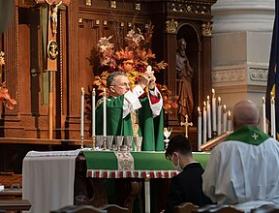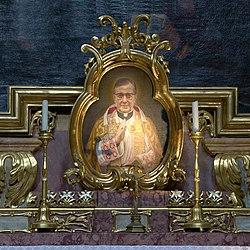Yesterday’s news of fresh scandal and rumors of scandal in the Church left me feeling like the little girl in Poltergeist. Her family had suffered a harrowing attack by demonic forces. As fresh attacks started, she turned to the camera and said, “No more.”
That’s exactly how I felt when Deacon Greg Kandra posted that another of our Church leaders has been accused of sexual misconduct. This came at the tag end of a day in which the Vatican issued a denial that the Holy Father’s resignation was in any way a response to what sounded like a cabal of homosexual cardinals within the Vatican and Cardinal Mahony loaded on with another of his weird, cardinal-from-space blog posts.
My reaction was exhaustion and depression and sadness, all rolled into a sigh. No more, indeed.
This is especially sad, coming as it does at a pivot point in history. The Catholic Church is the only unified Christian voice in the world today. Christianity is under attack as it has not been for 17 centuries, with Christians in many places quite literally under the gun. Even the Muslim invasion of Christian lands and the subsequent subjugation of entire Christian populations that took place in the Middle Ages did not have the universal, multi-faceted breadth of the challenges Christians face today.
What a terrible time for our leaders to become disgraceful, not for their fealty to Christ, which would inspire and edify all of us, but for their overweening self-absorption.
Before I went to bed last night, I read a remarkable post by one of my colleagues here at Patheos, Rabbi Yitzchok Adlerstein, who blogs at The Velvet Kippah. In this post, Rabbi Adlerstein asks Are Christians the New Jews? He says:
“If you want to understand us, study our story, learn of our pain.” That is what Jews told Christians who wanted to build new bridges of respect after the Holocaust. Ironically, when Christians begin listening to the story of the Jews, they are finding reflections of themselves.
Christians who listened learned of a Jewish history written in blood from ancient to modern times. When they thought of Christian martyrdom, on the other hand, they had to turn for the most part to antiquity, to early Christianity under the thumb of Roman emperors.
That has all changed. While Jews feel threatened by the massive explosion of global anti-Semitism in the last years, coupled with Iranian and Islamist calls for the genocidal destruction of all Jews, very few Jews in 2013 are dying because of their faith or their roots. Christians, on the other hand, have become the New Jews. (Read more here.
The violent persecution of Christians in the Middle East, which is what Rabbi Adlerstein is describing, is part — but only a part — of the tsunami of persecution that is heading toward Christianity and Christians today. In truth, violent persecution of Christians has spread over a good bit of the world. Christians are burnt, beaten, beheaded, kidnapped, raped, tortured and imprisoned with impunity in much of Africa, Asia, the Middle East and various Pacific nations.
At the same time, hate speech against Christians and Christianity has long been tolerated in the so-called Christian West. It is not only tolerated, but actively encouraged on many of our university campuses. Christians are increasingly faced with the choice of losing their jobs or following their faith throughout what has been for many centuries the stronghold of Christian faith.
We need leaders, and, fortunately, we have them. Our bishops have provided courageous leadership this past year against the overt government attack on religious freedom that the HHS Mandate represents. I am proud of them for this. They have my complete support and gratitude for doing it.
We are, as I said, at a pivot point. If we are going to turn back this tide of Christian-bashing bigotry, we must do it now, before it gets stronger. It is a great sadness that we keep getting battered by scandals at the highest levels in our Church in this perilous time.
I know that God makes all things, even bad things, work to the good. Good will come of these scandals. One good that I think we will see is a more authentic and committed priesthood. I am not one to criticize our priests. Based on my experience, I think they do their very best, and that this best is quite good. However, tough times are ahead. We are going to need priests who are committed to Christ to the death. The day is coming when we will need priests who can lead us through the fire.
I believe that these repeated scandals are the result of the Holy Spirit, cleaning things out. I don’t have any more insight into this than anyone else, but it seems to me that God just got enough. These abuses had to stop, and, even though the cure is quite painful, I believe that the scandals and the misery they bring to all of us will stop them.
So it is with the revelations of scandal from yesterday. These things have to be exposed because the Church cannot fail. The gates of hell will not prevail against this Church. There are times when things must be laid open because sunlight and air purify and heal. I think we are going through such a time in Church history today.
This brings me to something Cardinal Ratzinger wrote in 1969, decades before he became Pope Benedict XVI. I am going to quote it in its entirety because I think it is pertinent to what we face today. Read it prayerfully, and remember that St Paul told us, “The one who endures to the end will be saved.”
Do not let the sins of other people, including the sins of our religious leaders, lead you away from Christ or His Church. Do not throw away your salvation because someone else has sinned. Trust Jesus and endure to the end.
Cardinal Ratzinger’s comments in 1969 say in part:
The church will become small and will have to start afresh more or less from the beginning.
It will be hard-going for the Church, for the process of crystallization and clarification will cost her much valuable energy. It will make her poor and cause her to become the Church of the meek . . . The process will be long and wearisome as was the road from the false progressivism on the eve of the French Revolution — when a bishop might be thought smart if he made fun of dogmas and even insinuated that the existence of God was by no means certain . . . But when the trial of this sifting is past, a great power will flow from a more spiritualized and simplified Church. Men in a totally planned world will find themselves unspeakably lonely. If they have completely lost sight of God, they will feel the whole horror of their poverty. Then they will discover the little flock of believers as something wholly new. They will discover it as a hope that is meant for them, an answer for which they have always been searching in secret.She will no longer be able to inhabit many of the edifices she built in prosperity. As the number of her adherents diminishes . . . she will lose many of her social privileges. . . As a small society, [the Church] will make much bigger demands on the initiative of her individual members….
And so it seems certain to me that the Church is facing very hard times. The real crisis has scarcely begun. We will have to count on terrific upheavals. But I am equally certain about what will remain at the end: not the Church of the political cult, which is dead already, but the Church of faith. She may well no longer be the dominant social power to the extent that she was until recently; but she will enjoy a fresh blossoming and be seen as man’s home, where he will find life and hope beyond death.












